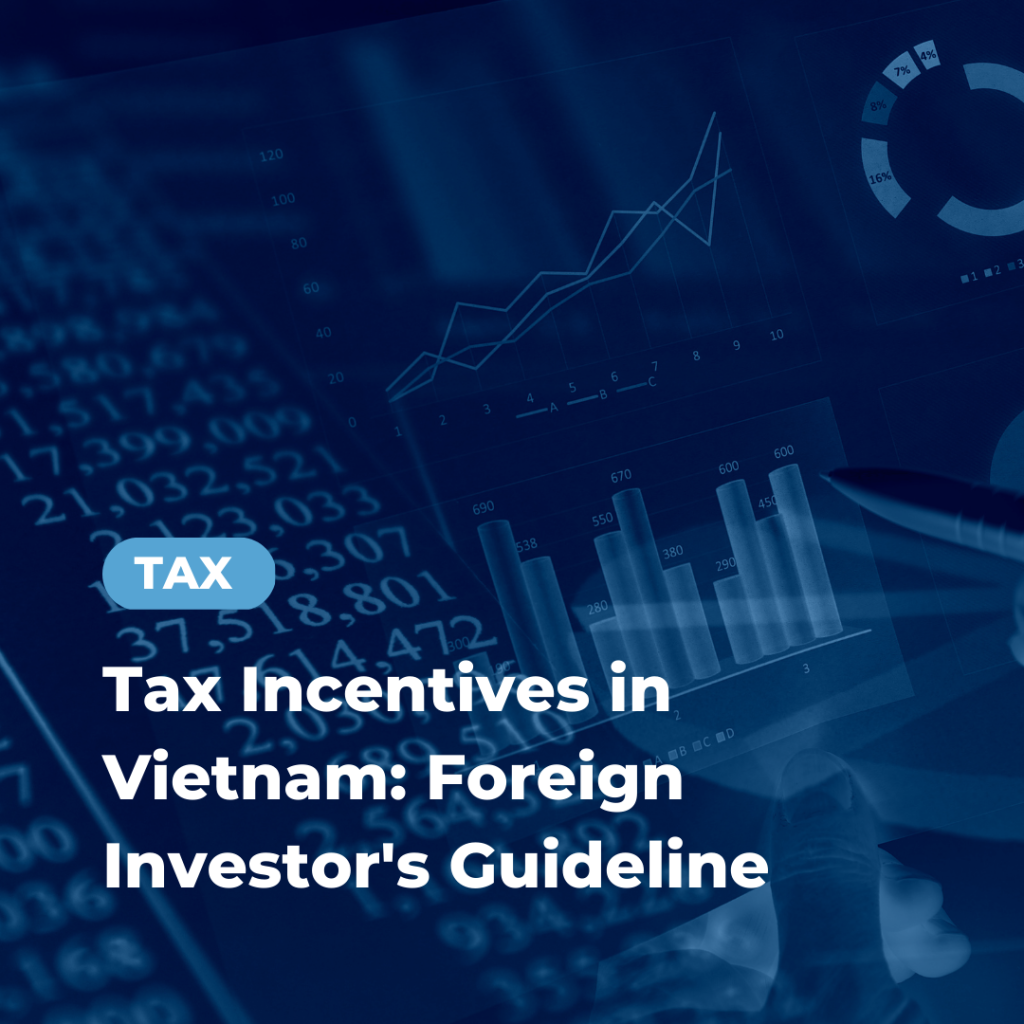Many companies are looking to Vietnam as a safer or second Asia investment choice for some manufacturing, product assembly, and other downstream services.
To help you take full advantage of the opportunities Vietnam provides for foreign investment businesses, we will provide you with an overview of the tax incentives in Vietnam in this post.
1. Taxes in Vietnam
Corporate income tax
Vietnam imposes a standard corporate income tax (CIT) at a 20% flat rate. However, the company may be eligible for corporate income tax incentives in Vietnam if it operates in highly-encouraged sectors or geographical areas.
Vietnam’s competitive corporation taxes are one of the primary factors that attracts foreign investors away from other Asian markets.
Depending on the location and specific project condition, CIT rates for businesses engaged in the oil and gas sector might range from 32% to 50%. Depending on where the project is located, CIT rates of 40% or 50% apply to businesses engaged in the prospecting, exploration, and exploitation of mineral resources (such as silver, gold, and gemstones).
Similar to previous years, in order to support enterprises being affected by COVID-19, the government has issued Decree 52/2021 on extension of deadlines for tax and land rental payments in 2021, which took effect from the signing date of 19 April 2021.
For CIT, there is no idea of tax residence. Organizations created for business purposes under Vietnamese legislation are liable to CIT and must report their international revenue. For overseas income, a 20% CIT is required. Tax advantages are not provided for this type of income.
Regardless of whether the services are delivered within or outside of Vietnam, international entities conducting business there without establishing a local legal entity or earning money there are regarded as foreign contractors. Payments made to foreign contractors are subject to the Foreign Contractor Tax (FCT), which is made up of CIT and VAT components.
The Corporate Tax Rate in Vietnam 2014-2022
| Country | Corporate income tax rate |
| Vietnam | 20% |
| Malaysia | 24% |
| China | 25% |
| Indonesia | 25% |
| Philippines | 30% |
Source: Trading Economics
Personal income tax
Personal income tax in Vietnam varies based on your residency status and types of income. The important number to remember is 183 days. Resident taxpayers are subject to PIT at progressive rates ranging from 5 percent to a maximum of 35 percent, while non-resident taxpayers are subject to personal income tax at a fixed rate of 20 percent on their Vietnam-sourced income.


Generally, business income (revenue exceeding 100 million VND) is taxed at different rates depending on different sectors. Besides, two legal ways to reduce payable personal income tax are Family circumstance deduction and donation deduction.
Valued-added tax
For foreigners investing in Vietnam, doing trade/manufacturing and selling products/services in the country: The VAT amount will be 100% the same as that of businesses in Vietnam. This is detailed in the tax law.
Value-added tax is applied to goods and services and can be either 0%, 5%, or 10%. In most cases, the VAT is levied at a 10% rate.
Note that all companies have to submit outcome VAT when they sell their goods and services. A lot of companies refuse to issue VAT invoices if you don’t request for them before or on the same day of the purchase.
- Philippine standard 12% VAT standard rate
- Thailand Reduced 7% VAT standard rate until 09/2023 then Standard 10% VAT
- Cambodia 19% VAT standard rate with 7% VAT reduced rate for some industries
- Malaysia 10% Sales tax rate and 6% Service tax rate with a 5% Sales tax reduced rate for some industries
- Indonesia 11% VAT Standard rate
2. Tax Incentives for Foreign Investors in Vietnam
The Vietnamese government offers numerous investment-related business incentives and is continually making further improvements through both reforms and by further upgrading its incentives to maintain the country’s high appeal to foreign investors.
Vietnam’s Law on Investment specifies the three forms of incentives that are available to companies operating within the country.
Corporate Income Tax (CIT) incentives
Corporate Income Tax Incentives are one of the most attractive features of the Vietnamese business landscape and tend to be one most important among investment incentives to foreign investors. Corporate income tax (CIT) incentives are granted to both foreign and local investors, to promote investment in sectors or areas that are on par with the national development strategies.
There are two main types of tax incentives in Vietnam:
- Preferential tax rates – reduced tax rates
- Tax holidays – tax exempted for a certain period of time or throughout the project
Preferential CIT rates
- 10% for the lifetime of the entire project
- 10% for 15 years from the first year of income generation;
- 17% for the lifetime of the entire project;
- 17% for 10 years from the first year of income generation.
Tax holidays
- Tax exemption for 4 years, 50% reduction of payable tax amounts for 9 subsequent years;
- Tax exemption for 4 years, 50% reduction of payable tax amounts for 5 subsequent years;
- Tax exemption for 2 years, 50% reduction of payable tax amount for 4 subsequent years.
In certain situations, locations and industries, it is possible to combine both.
Incentives for Prioritized Sectors
Certain sectors in Vietnam are encouraged for investment, and include industries that the government plans to incentivize, facilitate investment in, or which are beneficial for society:
- high-tech industries;
- renewable energy;
- education;
- health care;
- supporting products used in high-tech industries;
- software products;
- research and development;
- selected agricultural and allied sectors;
- infrastructure development;
- sports and culture.
Incentives in disadvantaged locations
In order to attract more capital and development to certain areas, the Vietnamese government provides incentives in the form of tax exemptions. These are given based on what the economic landscape looks like and what the current regional or industry needs are.
According to infrastructure, ease of access, and the level of development of the economic zone, there are disparities between disadvantaged sites and very disadvantaged locations for location-based incentives.
Preferential Corporate Income Tax and tax holidays are advantageous for investments in both disadvantaged and very disadvantaged places. Their amount of motivation is closely related to how underdeveloped these areas are.
Customs and Land Rental Incentives (non-tax based)
Customs duty exemptions
Businesses may also be exempt from import duties if they fall under one of the following categories:
- goods imported to serve as raw materials and supplies for the production of software products that cannot be produced domestically;
- goods imported for use in scientific research and technological development;
- goods imported for export processing contracts with foreign parties.
Land Rental Incentives
A variety of investment projects are eligible for a land rental charge exemption if they meet certain requirements, such investing in particular sectors of the economy or choosing specified locations:
- Exemption for the whole operational period: projects on the list of special investment encouragement sectors investing in regions with particularly difficult socioeconomic conditions;
- 15 years of exemption: projects on the list of special investment encouragement sectors investing in regions with difficult socioeconomic conditions are exempt for the entire operational period. or investments in regions with highly challenging socioeconomic conditions made through projects on the list of investment stimulus sectors;
- 11 years of exemption: projects in the list of special investment encouragement sectors; projects in the list of investment. encouragement sectors investing in challenging socioeconomic areas;
- 7 years of exemption: projects investing in areas with extremely difficult socioeconomic circumstances initiatives that invest in regions with challenging socioeconomic situations;
- 3 years of exemption: Projects on the list of investment stimulation sectors are exempt for seven years; company and production relocation owing to urban planning or environmental contamination is exempt for three years.
Special incentives
More recently, the Prime Minister issued Decision 29/2021/QD-TTg providing the levels, duration, and conditions for the application of special incentives for investment projects which are granted based on the satisfaction of the law-specified criteria on investment capital, high technology, technological transfer, added value, and value chain participation of Vietnamese enterprises.
The new regulation Is expected to encourage foreign investors with large capital amounts and high technologies to make long-term commitments with Vietnam while promoting the process of technology transfer and increasing the spillover effects of FDI
3. Vietnam’s Free Trade and tax agreements
Vietnam’s accession to the World Trade Organization (WTO) in 2007 marked its ascension as a committed and robust trade partner for the global community. Since then, the country has entered into numerous Free Trade Agreements and Double Tax Avoidance Agreements.
Free Trade Agreements
A Free Commercial Agreement (FTA) is a sort of contract used by two or more nations to determine the conditions of their trade relations. These agreements establish the amount of import and export taxes and charges that various nations apply.
Vietnam is a party to the following significant multi-regional FTAs as a result of its membership in the ASEAN (Association of Southeast Asian Nations) bloc: RCEP (The Regional Comprehensive Economic Partnership), CPTPP (The Comprehensive and Progressive Agreement for Trans-Pacific Partnership), and EVFTA (The EU-Vietnam Free Trade Agreement).
Vietnam has ratified more than a dozen bilateral and multilateral free trade agreements, giving it advantages in direct trade with the following nations and regions: Australia, Brunei, Burma, Cambodia, Canada, Chile, China, Indonesia, Japan, Laos, Malaysia, Mexico, New Zealand, Philippines, Singapore, Thailand, United States, Vietnam, European Union Countries, Eurasian Economic Union countries.
A special highlight last year was that amid the complex COVID-19 pandemic, the participation in FTAs, especially new-generation ones like the Comprehensive and Progressive Agreement for Trans-Pacific Partnership (CPTPP), the EU – Vietnam FTA (EVFTA), and the UK – Vietnam FTA (UKVFTA), has helped the Southeast Asian nation secure impressive export growth and partly mitigate the pandemic’s adverse impacts on its economy.
Double Tax Avoidance Agreements
Via discovering exclusions or lowering the total amount of taxes owed in Vietnam, double taxation is successfully eliminated by double tax avoidance agreements.
More than 80 nations and territories, including France, China, and Canada, have DTAs with Vietnam as of 2022. By defining exemptions or lowering the tax that residents of the parties of the accords must pay in Vietnam, these treaties avoid double taxation.
Thus, it is highly beneficial for foreign investors to be aware of whether double taxation avoidance agreements (DTAAs) between Vietnam and other nations may be applicable to their case, as well as to be familiar with how these agreements are applied.
If you need any further consultancy, please kindly email us at hello@innolab.asia.
Reference
2020, Luật Quản Lý thuế, Luật Thuế Thu nhập Doanh nghiệp, Luật thuế giá trị Gia Tăng, Luật Thuế Thu nhập cá nhân, Luật Thuế Tiêu thụ đặc biệt, Luật Thuế Xuất Khẩu, thuế nhập Khẩu Và các Chính Sách thuế hiện Hành mới nhất. Ho Chi Minh, Thành phố Hồ Chí Minh.
Guide to personal income tax in Vietnam for foreigners 2022 (2022) BBCIncorp. Available at: https://bbcincorp.com/vn/articles/personal-income-tax-in-vietnam (Accessed: January 13, 2023).
Incentives for foreign investors in Vietnam (no date) Grant Thornton Vietnam | Audit | Tax | Advisory | Business Process Solutions. Available at: https://www.grantthornton.com.vn/insights/articles/tax/bloomberg/0721-incentives-for-foreign-investors-in-vietnam/ (Accessed: January 13, 2023).
One IBC Limited (2020) Top 9 reasons – why to invest in Vietnam?, One IBC Limited. One IBC Limited. Available at: https://www.offshorecompanycorp.com/insight/jurisdiction-update/top-reasons-why-to-invest-in-vietnam?gclid=CjwKCAiA2fmdBhBpEiwA4CcHzdxSCjPbFIr6nVnjRwNTLaZ_b0KskkYDEut9sH-A14h_otri8RzcEhoCGfMQAvD_BwE (Accessed: January 13, 2023).
Pärnapuu, K. (2021) Tax incentives in Vietnam: Foreign Investor’s Guide, Emerhub. Available at: https://emerhub.com/vietnam/tax-incentives-vietnam/#h2_0 (Accessed: January 13, 2023).
Tuấn, N.Q. (2022) Investment in Vietnam: Market entry procedures: Viva BCS, VIVA Business Consulting. Available at: https://vivabcs.com.vn/resources/market-entry-procedures-in-vietnam/ (Accessed: January 13, 2023).
Vietnam’s International Free Trade agreements (no date) Vietnam Guide – Vietnam’s International Free Trade Agreements | Doing Business in Vietnam. Available at: https://www.vietnam-briefing.com/doing-business-guide/vietnam/why-vietnam/vietnam-s-international-free-trade-and-tax-agreements (Accessed: January 13, 2023).
The World and Vietnam Report (no date) FTAs to generate more benefits for Vietnam in 2023: Minister of industry and trade, The World and Vietnam Report. Available at: https://en.baoquocte.vn/ftas-to-generate-more-benefits-for-vietnam-in-2023-minister-of-industry-and-trade-212504.html (Accessed: January 13, 2023).



